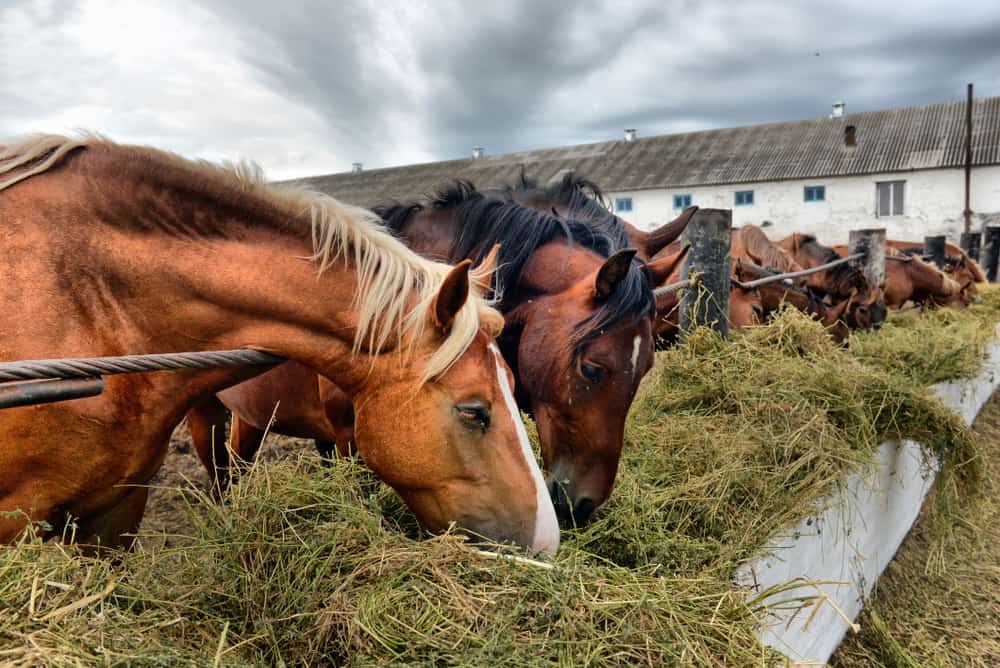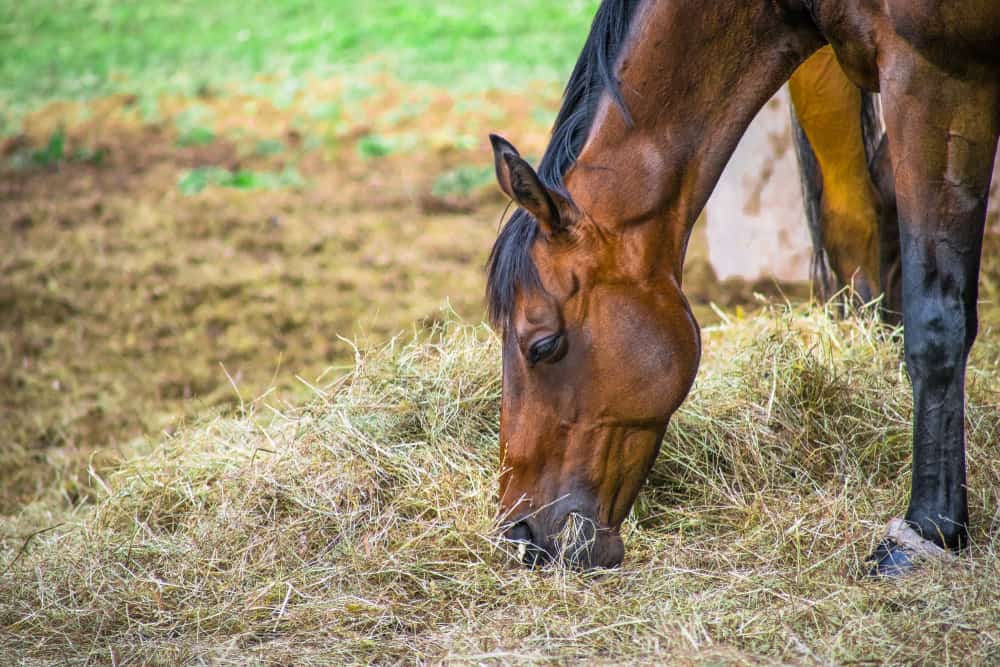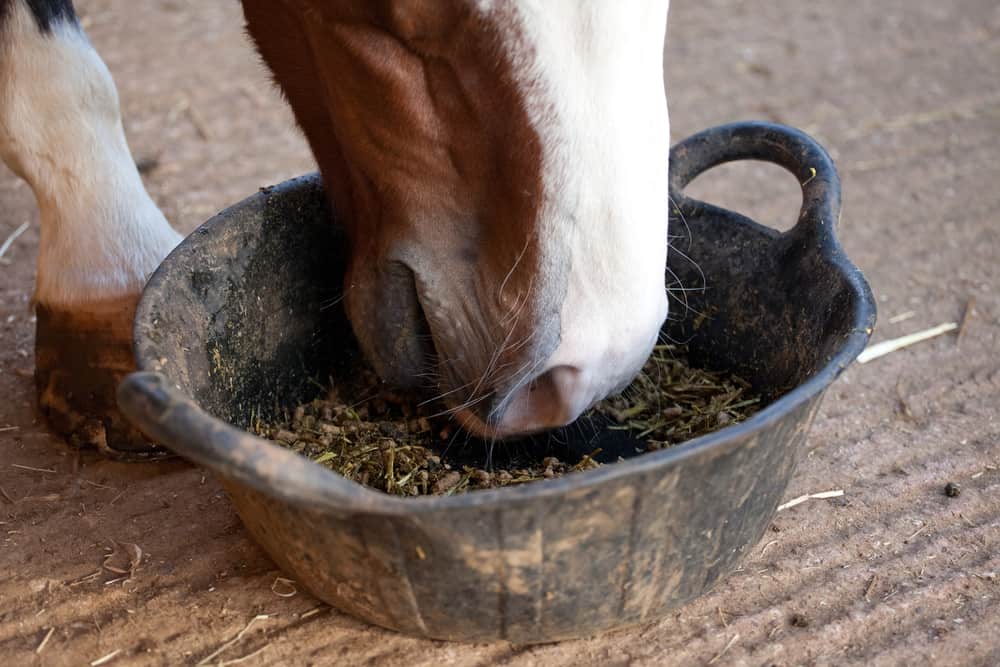Horses are some of the most popular animals on our planet because they are beautiful, wonderfully talented, and functional. So many people dream of having a horse for a pet, and if they are fortunate enough to have a horse at their homestead or farm, they might wonder what things horses most like to eat.
Horse Habits and Biology
We have been living in harmony with these majestic hooved mammals called ungulates for thousands of years. In fact, horses have been around for about 50 million years. Although most horses we encounter today are domestic horses, they all descend from wild horses that have become extinct.
Horses can range in size from 76 centimeters to 175 centimeters if measured from their shoulders down to the ground. In addition, their body weight can range from 120 pounds to 2,200 pounds. There is such a massive variety of horses today because people have been breeding horses with selective breeding.
Interestingly enough, the largest horse to have ever lived was almost 7 feet in height. The horse’s name was Big Jake, and it was a Belgian horse. In contrast to this, the world’s smallest horse was only 44,5 cm in height and was called Thumbelina because of its miniature stature.
Horses can move in four ways. They can walk, trot, canter, or gallop. On average, a healthy horse will be able to reach a speed of 30mph when galloping. The fastest horse of all time could reach a speed of 44 mph.
Horses’ hooves consist of keratin, a protein that makes up our fingernails, too, and similarly to our fingernails, a horse’s hooves always continue to grow. Therefore, it is not uncommon for the owners of horses to have to trim their hooves when they become uncomfortable. Metal horseshoes have become very popular amongst horse owners because they keep the horse’s hooves safe.
When horses are left to breed naturally, they will typically breed from April to June. The gestation period for a horse is 11 months, and mares deliver live young after the gestation period has passed. It is common for baby horses that are called foals to stand within their first hour of life and eat solid food within their first week. However, a mare will continue to nurse her young for up to two years.
Horses commonly live for 25 to 30 years. However, longer lifespans reaching up to 60 years have been recorded. Mustangs that are wild horses have a lifespan of 36 years.
What Do Horses Like to Eat Most?
It is common to see horses grazing in the fields all day. They seem to be eating nearly permanently. The truth is that horses eat frequently but consume a little bit at a time, so it makes sense that they need to eat for most of the day. Here are the foods that horses enjoy eating the most:
- Grass – Horses adore eating grass, and they will happily munch on grass all day long. In fact, grass is their most natural food, and it offers excellent benefits for their digestive systems. However, if you own horses, you should keep an eye on any horse that is eating too much grass since the overconsumption of grass can lead to laminitis. Another factor to keep in mind is if you have horses that are free to graze, you should make sure that no plants can harm your horses.
- Hay – Hay or Haylage is a great way to keep your horses well fed during cool months when grass might not be readily available. Hay is terrific for horses’ digestive systems.
- Vegetables and fruit – Vegetables and fruit are a great way to add a bit of moisture to your horse’s diet since grass and hay can be pretty dry. The best vegetable to treat your horses with is a carrot. You can cut your carrot down the length to make feeding easy. When it comes to fruit, the best fruit for your horse is an apple. They are juicy and easy to digest. Please be aware that horses can’t consume all fruit and vegetables, and some of them can be quite harmful to horses. You can read more about this in our ‘Food Horses Should Avoid’ section.
- Concentrates – Vets often recommend horse owners to give their horses concentrates if the horse is pregnant, nursing, old, or a competitive horse. Concentrates are grains, so they include corn, barley, and oats. These are great energy boosters, but they can be harmful if the wrong combinations are fed to your horse because it leads to mineral imbalances.
- Salt – Horses enjoy eating salt, especially when it is scorching. You can give your horse some loose salt or use a salt lick block for some salt consumption that your horse will love.
It is clear that horses are straightforward to please when it comes to feeding. If you are lucky enough to have a large enough pasture for your horses to roam free and enjoy the grass, you can add some tasty fruit and vegetable treats to boost their diet. However, if you don’t have access to large amounts of grass, you can look into ordering hay as an alternative.
Food to Avoid Feeding Horses
Horse lovers are tempted to spoil their horses with tasty delights, but they should be aware of what horses can and cannot eat. This is because you can severely affect your horse’s health if you feed your horse the wrong food. These are the foods that you should never feed to your horse:
- Too much fruit or vegetables – If your horse eats too much of this, it can suffer serious health problems that include obesity, colic, and a foot issue called laminitis. So how much is too much? It is best never to give your horse more than two pieces of fruit a day. A serving of fruit would be a solid wedge size. You can give your horse two carrots a day or one serving of other vegetables when it comes to vegetables. Since the overconsumption of fruit can be harmful to your horse, you should make sure that your horse doesn’t have access to a fruit tree or an orchard while grazing. It is also best to ask people who contact your horse not to feed it fruit or vegetables.
- Stone fruits – It is best never to give your horse a pitted fruit since they can be choking.
- Chocolate or food that is high in sugar – Your horse might love these sweet treats, but they only lead to unnecessary health complications.
- Cake or bread – Cake or bread can cause severe blockage in the digestive tract of your horse.
- Meat – You should never feed your horse meat since meat doesn’t offer any nutritional value to horses.
- Cabbage-related vegetables – These include Brussel sprouts, turnips, cabbage, kale, and broccoli. These vegetables will make your horse feel gassy and uncomfortable.
- Tomatoes and potatoes – It is best not to feed any tomatoes or potatoes to your horse since they can lead to digestive discomfort.
- Garden waste – Although it isn’t an unusual thought to want to give your garden clippings and waste to your horse, you should not do it. The reason for this is because you might treat your garden with sprays that can be toxic for horses. In addition, your garden clippings might contain harmful weeds. Horses can easily get colic from garden waste.
- Hay that has become moldy – You should never feed any moldy products to your horse since they can get lung damage from mold-covered food.
- Brans – Unless a vet has prescribed bran as part of your horse’s diet, it is best to avoid feeding your horse any bran products.
Tips to Feed Horses
When it comes to treating your horse to special delights, you can feed your horse by hand using cut fruit and vegetables. Here are a few tips you can keep in mind when feeding your horse:
- Keep fruit and vegetables in sizable portions that will be easy for your horse to bite and eat.
- Be sure to remove any hard peels or pips as they can be a choking hazard.
- Wash fruit and vegetables nicely before cutting them and giving them to your horse as a tasty snack.
- Remember not to overdo treats and snacks. Your horse might be loving them, but the overconsumption of treats will leave your horse feeling uncomfortable and risking health complications.
- If you notice any spotting, organic growth or mold on your fruit or vegetables, don’t give it to your horse.
- If your horse loves consuming salt, limit the intake of salt because overindulgence isn’t healthy.
Summary
Horses are wonderful animals that people love to ride, touch, watch, and feed. By knowing what horses most like to eat, you can give your horse everything that it enjoys to eat while making sure you keep it within healthy limits. You can make your horse’s diet exciting with great versatility without any health risks.


